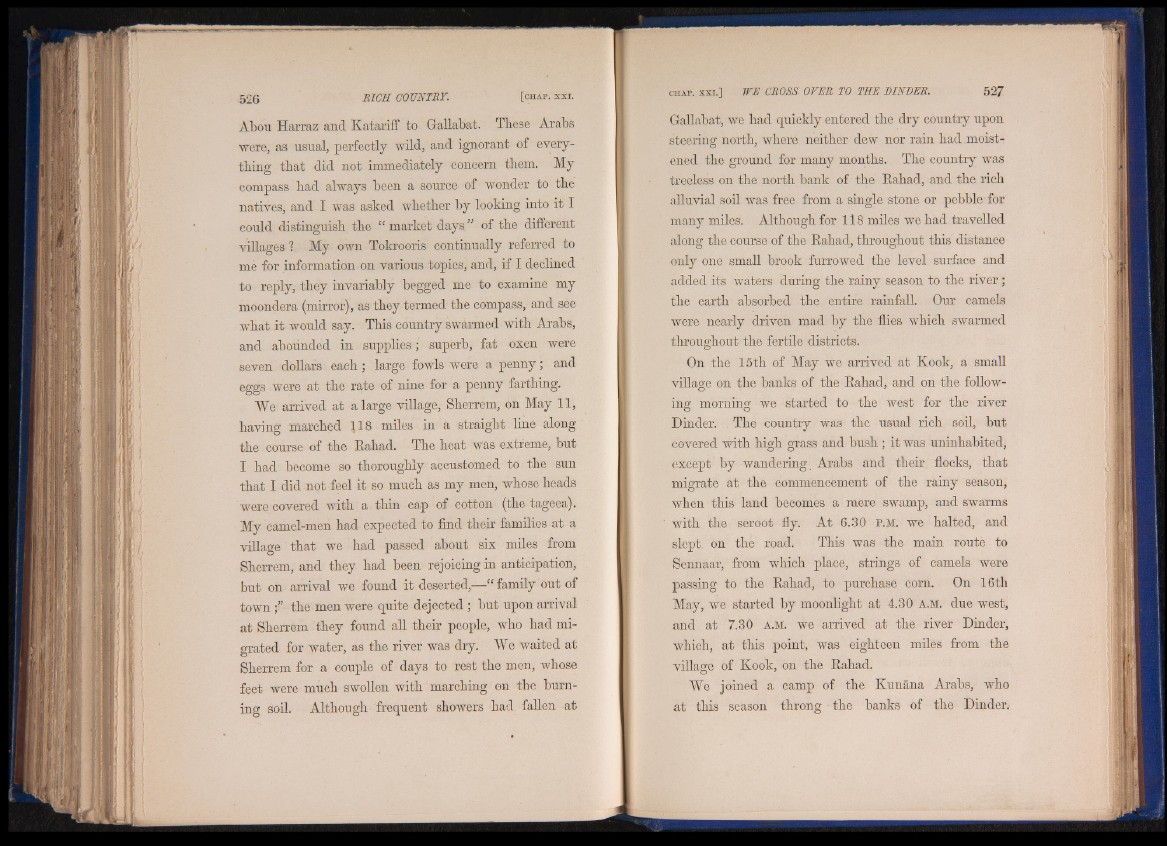
526
M
I
Abou Harraz and Katariff to G-allabat. These Arabs
were, as usual, perfectly wild, and ignorant of everything
that did not immediately concern them. My
compass had always been a source of wonder to the
natives, and I was asked whether by looking into it I
could distinguish the “ market days” of the different
villages ? My own Tokrooris continually referred to
me for information on Various topics, and, if I declined
to reply, they invariably begged me to examine my
moondera (mirror), as they termed the compass, and see
what it would say. This country swarmed with Arabs,
and abounded in supplies; superb, fat oxen were
seven dollars each; large fowls were a penny\ and
eggs were at the rate of nine for a penny farthing.
We arrived at a large village, Sherrem, on May 11,
having marched 118 miles in a straight line along
the course of the Rahad. The heat was extreme, but
I had become so thoroughly accustomed to the sun
that I did not feel it so much as my men, whose heads
were covered with a thin cap of cotton (the tageea).
My camel-men had expected to find their families at a
village that we had passed about six miles from
Sherrem, and they had been rejoicing in anticipation,
but on arrival we found it deserted,—“ family out of
town the men were quite dejected ; but upon arrival
at Sherrem they found all their people, who had migrated
for water, as the river was dry. We waited at
Sherrem for a couple of days to rest the men, whose
feet were much swollen with marching on the burning
soil. Although frequent showers had fallen at
il
Gallabat, we had quickly entered the dry country upon
steering north, where neither dew nor rain had moistened
the ground for many months. The country was
treeless on the north bank of the Rahad, and the rich
alluvial soil was free from a single stone or pebble for
many miles. Although for 118 miles we had travelled
along the course of the Rahad, throughout this distance
only one small brook furrowed the level surface and
added its waters during the rainy season to the river;
the earth absorbed the. entire rainfall. Our camels
were nearly driven mad by the flies which swarmed
throughout the fertile districts.
On the 15 th of May we arrived at Kook, a small
village on the banks of the Rahad, and on the follow- O ■ *
ing morning we started to the west for the river o O Dinder. The country was the usual rich soil, but
covered with high grass and bush ; it was uninhabited,
except by wandering. Arabs and their flocks, that
migrate at the commencement of the rainy season,
when this land becomes a mere swamp, and swarms
with the seroot fly. At 6.30 p.m. we halted, and
slept, on the road. This was the main route to
Sennaar, from which place, strings of camels were
passing to the Rahad, to purchase corn. On 16th
May, we started by moonlight at 4.30 a .m. due west,
and at 7.30 a .m. we arrived at the river Dinder,
which, at this point, was eighteen miles from the
village O of Kook,< on the Rahad.
We joined a camp of the Kunana Arabs, who
at this season throng the banks of the Dinder.-
Sili